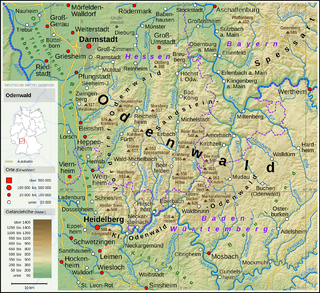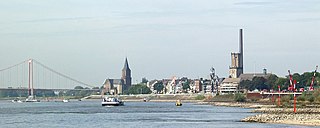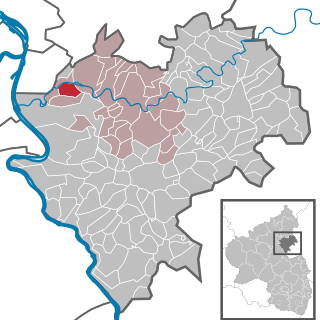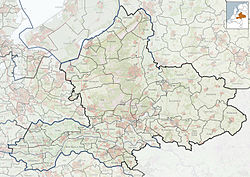
Nijmegen is the largest city in the Dutch province of Gelderland and the tenth largest of the Netherlands as a whole. Located on the Waal River close to the German border, Nijmegen is one of the oldest cities in the Netherlands and the first to be recognized as such in Roman times. In 2005, it celebrated 2,000 years of existence.

Renkum is a municipality and a town in the eastern Netherlands. The municipality had a population of 31,417 in 2021 and has a land area of 45.95 km2 (17.74 sq mi). Renkum is situated along the river Rhine. The municipality Renkum is part of the Stadsregio Arnhem-Nijmegen.

The Odenwald is a low mountain range in the German states of Hesse, Bavaria and Baden-Württemberg.

Hohenems is a town in the Austrian state of Vorarlberg in the Dornbirn district. It lies in the middle of the Austrian part of the Rhine valley. With a population of 16,946, it is the fifth largest municipality in Vorarlberg. Hohenems' attractions include a Renaissance palace dating back to the 16th century, a Jewish history museum, and the old town center.

Operation Pegasus was a military operation carried out on the Lower Rhine near the village of Renkum, close to Arnhem in the Netherlands. Overnight on 22–23 October 1944, Allied military forces, Britain's MI9 intelligence organization, and the Dutch Resistance evacuated 138 men, mostly soldiers trapped in German-occupied territory who had been in hiding since the Battle of Arnhem a month earlier.

The Veluwe is a forest-rich ridge of hills in the province of Gelderland in the Netherlands. The Veluwe features many different landscapes, including woodland, heath, some small lakes and Europe's largest sand drifts.

Nederrijn is the Dutch part of the Rhine from the confluence at the town of Angeren of the cut-off Rhine bend of Oude Rijn (Gelderland) and the Pannerdens Kanaal. The city of Arnhem lies on the right (north) bank of the Nederrijn, just past the point where the IJssel branches off. The Nederrijn flows on to the city of Wijk bij Duurstede, from where it continues as the Lek. The once-important but now small Kromme Rijn branch carries the name "Rhine" towards the city of Utrecht.

Lobith is a village in the Dutch province of Gelderland. It is located in the municipality of Zevenaar. Traditionally, it is said that the Rhine enters the Netherlands at Lobith, although in reality, this happens about 4 km further upstream, near Spijk.

Oosterbeek is a village in the eastern part of Netherlands. It is located in the municipality of Renkum in the province of Gelderland, about 5 km (3.1 mi) west of Arnhem.

Neustadt an der Weinstraße is a town in Rhineland-Palatinate, Germany. With 53,300 inhabitants as of 2020, it is the largest town called Neustadt.

Emmerich am Rhein is a city and municipality in the northwest of the German federal state of North Rhine-Westphalia. The city has a harbour and a quay at the Rhine. In terms of local government organization, it is a medium-sized city belonging to the district of Kleve in the administrative region (Regierungsbezirk) of Düsseldorf.

Bennekom is a village and parish in the Netherlands, which is part of the Municipality of Ede in the south-west of the Veluwe district of the Province of Gelderland. It adjoins the town of Wageningen on the Lower-Rhine to the south, and Ede to the north, Veenendaal to the west and Renkum to the east. The western boundary of the parish follows the canalized River Grift and is also the boundary with the Province of Utrecht.

Lahnstein is a verband-free town of Rhein-Lahn-Kreis in Rhineland-Palatinate, Germany. It is situated at the confluence of the Lahn with the Rhine, approximately 6 kilometres (3.7 mi) south of Koblenz. Lahnstein was created in 1969 by the merger of the previously independent towns of Oberlahnstein on the south side of the Lahn and Niederlahnstein on the north side. In 2020, it had a population of 18,030.

Geldern is a city in the federal German state of North Rhine-Westphalia. It is part of the district of Kleve, which is part of the Düsseldorf administrative region. The Dutch province of Gelderland is named after this city.

Koudekerk aan den Rijn is a village located in the municipality of Alphen aan den Rijn, Netherlands. It is located about 4 km west of the urban centre, in the province of South Holland.

Doorwerth Castle is a medieval castle situated on the river Rhine near the city of Arnhem, Netherlands.

Nievern is a municipality in the district of Rhein-Lahn, in Rhineland-Palatinate, in western Germany. It belongs to the association community of Bad Ems-Nassau.

The Airborne Museum ‘Hartenstein’ in Oosterbeek, The Netherlands is dedicated to the Battle of Arnhem in which the Allied Forces attempted to form a bridgehead on the northern banks of the Rhine river in September 1944. Hartenstein served as the headquarters of the British 1st Airborne Division. In the museum an extensive and diverse collection is displayed consisting of original weaponry, genuine uniforms and equipment used in the battle. The numerous photos and films on display provide a realistic picture which is enhanced by interviews with Allied soldiers. In addition the museum has an award-winning Airborne Experience exhibition, that depicts the area around Arnhem and Oosterbeek during the battle. The museum also provides German and civilian perspectives.

The Speyerbach is a left tributary of the Rhine in the Palatinate part of Rhineland-Palatinate. In Speyer, the river split into Gießhübelbach and Woogbach. The Woogbach changes its name to Nonnenbach, then flows into Gießhübelbach shortly before the latter flows into the Rhine.

Heveadorp is a village near Doorwerth in the municipality of Renkum, Gelderland, the Netherlands. The village is situated in a valley surrounded by forest. The creek Seelbeek runs through the village. Heveadorp was founded in 1916 by Dirk Frans Wilhelmi as a company town for the workers of his rubber factory Heveafabriek. Hevea is the scientific name for the rubber plant.



























